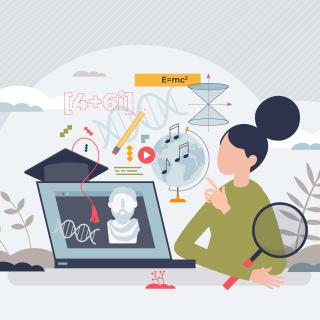Norway: Digital learning analytics in a Norwegian context

The Norwegian Ministry of Education and Research has appointed an expert group to investigate how digital learning analytics can be utilised for improving the learning processes. Digital learning analytics is about using digital technology to sort, analyse and interpret data on learning and pupils’/students’ activities to gain new insights.
There is a great deal of uncertainty surrounding many matters related to digitalisation in general and to data from pupils and students in particular. On the one hand, we see a clear possibility in analysing what students do digitally. When the digital learning platform is a more frequent meeting place than the physical teaching room, teachers are curious about how learning analysis can promote students' learning. The teachers explore how they can develop their teaching and adapt it better to the students. Parents, on the other hand, may expect a better insight into their children's academic development and thus also support learning to a greater extent. Rectors and study program leaders are watching with interest which data can be collected, analysed, and provide a basis for better learning.
But there are also concerns. Do the educational institutions have the legal basis for informing the teachers about students logged-on-time? Staff discuss what the purchased teaching aid measures. The students want to know when the computers are tracking what they are working on. They look for room to work without supervision, and with the opportunity to make mistakes without them being saved and visible to others. Parents are concerned about what data commercial players get about their children during the school day. Politicians and school leaders fear that the real interest of the providers is not to make money from licenses, but to harvest valuable rich data about real people.
In other words, learning analysis offers opportunities, but also great challenges. First and foremost, it is a desired digitalisation of schools and society that has opened the way for this, and the result so far has been that a market-driven technology development has been given a free scope.
In the Norwegian education system, we have many digital tools with functionality for learning analysis, but little systematic knowledge about the extent to which learning analysis takes place. Only when this cycle leads to a change in the direction of better learning, may we talk about learning analysis.
Based on interviews and discussions with stakeholders from various sectors and organisations (including children and young people), the expert group puts forward four main recommendations in the official Norwegian report. The recommendations aim to support good and sound learning analysis. They would preferably be seen together, although they are aimed at various levels of the education sector, because the path through an educational course should involve a certain degree of coherence and predictability. However, the recommendations partly interact and complement each other:
- The expert group recommends clarifying the legal basis for learning analysis in basic education, in higher education and in higher vocational education. The purpose of these recommendations is to clarify the legal basis for processing of personal data.
- The expert group recommends drawing up a norm for privacy in basic education, to strengthen the students' privacy and facilitate good privacy practices, increased awareness, and better competence about privacy.
- The expert group recommends establishing frameworks for good learning analysis in basic education. The purpose of this recommendation is to strengthen the freedom of choice of students and teachers and to provide a better basis for educational decisions about learning analysis to promote learning.
- The expert group recommends developing overall guidelines for good and sound learning analysis in higher education and higher vocational education. The purpose of this recommendation is to facilitate good privacy practices and proper learning analysis that promotes students' learning and increases the quality of education.
Source: Eurydice Unit Norway
Picture credit: Adobe Stock #619724516




